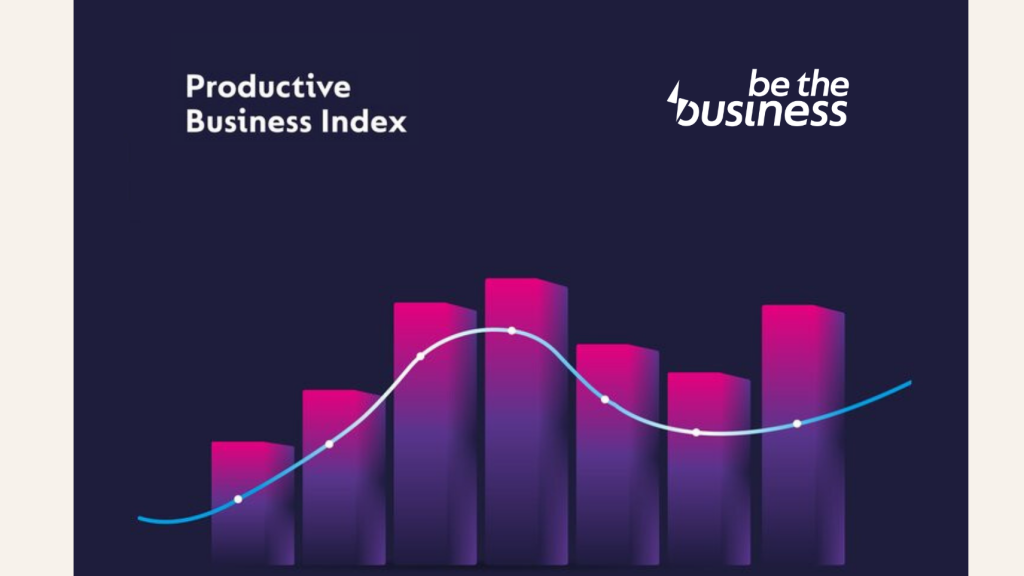London, 20 April 2023: Small and medium-sized businesses report significantly lower capabilities in areas linked to high productivity, according to new research by Be the Business, a charity that champions small business productivity.
Measuring performance, expectations, and the actions businesses plan to take to drive growth in the future, Be the Business CEO Antony Impey says the findings "require a redoubling of efforts to get businesses thinking about productivity in their businesses".
Key findings include:
A second consecutive fall in the headline Productive Business Index which is published twice annually
The Index stands at 111.4, which is 1.2 points lower than the 5th edition published in October and 10 points lower than Q1 2022
This fall was driven by a significant drop in action taken by SME leaders to improve management skills, HR practices and operational efficiency, all of which have a proven link to higher levels of productivity
Businesses that operate a hybrid model report higher performance and stronger capabilities than remote businesses and those operating from a dedicated work environment, like an office or factory
Business leaders who regularly seek advice report significantly higher levels of business performance and activity to improve capabilities
Commenting on the findings, Anthony Impey MBE, CEO of Be the Business, said:
“There isn’t a secret to higher levels of business productivity. It is a code that’s already been cracked. Businesses which invest in their management skills, HR, operations and technology are stronger performers than those which don’t.
“It is worrying that fewer business leaders have taken action in these areas compared to last year. The sustained growth needed for a higher wage economy won’t happen without more businesses building their management skills.”
UK productivity has grown at an average of 0.4% per year since 2008, compared to the OECD average of 0.9%. Lower productivity significantly inhibits the ability of both the public and private sectors to offer wages that keep up with or pace ahead of inflation.
Too soon to end working from home?
The report explored the post-pandemic legacy of hybrid working and its impact on productivity. Be the Business found that businesses that have implemented a hybrid model are more likely to be working on the skills linked to higher productivity levels. In contrast, those primarily operating a remote model aren’t investing in their skills to the same extent.
More than four in 10 (42%) of hybrid businesses will further develop their business strategy in the next 12 months compared to less than a third (31%) of remote businesses. A similar trend is found in planned financial forecasting activity and management skills development.
Anthony Impey added:
“The businesses debating a return to offices should ensure they don’t lose the productivity benefits hybrid arrangements provide. And those businesses operating entirely remotely should ensure they find opportunities to collaborate and provide a supportive environment to younger workers, both of which appear to be areas of organisational weakness.”
Advice pays
The report also compared the responses of business leaders who regularly seek advice to those who don’t look externally for help. It found that those who regularly seek advice are more than twice as likely to report an improved financial situation compared to businesses that do not look externally. Business leaders who get advice also reported larger amounts of new employment and an increased volume of orders.
Anthony Impey added:
“Getting advice pays off in real and meaningful ways. Those who do so regularly show increased revenues, fuller order books and more employment. By contrast, those who don’t seek advice appear overconfident in their management skills.
“There needs to be a collective effort from the business community and government to demonstrate the value of an external perspective to business productivity and performance.”
Editor’s Notes:
The Productive Business Index
These are among the key findings of the sixth Productive Business Index, published by Be the Business, a leading not-for-profit business membership body.
Be the Business surveys over one thousand founders, owners and leaders of the UK’s SMEs to track changes in five areas of business activity;
Management capability;
Technology adoption;
Training, development and HR;
Operating efficiency;
and Innovation.
The Productive Business Index: Edition Six can be found at www.bethebusiness.com/our-thinking
The data is derived from a large-scale survey of 1,179 senior decision-makers working in companies of 2 - 249 employees conducted by Opinium between 1st and 14th March 2023.
About Be the Business:
Be the Business are the small business productivity champions. We inspire behaviour change in business leaders to deliver greater productivity by convening private sector expertise, innovating impactful programmes and identifying ways to increase demand for business support.
In doing so, we aim to transform the UK economy, raise the value of businesses in our communities, safeguard jobs and improve standards of living.
We offer access to experts who can help others understand the UK's productivity puzzle; business leaders who are getting big results by doing things differently; and research focused on improving productivity.
Related
Free business support programme boosts skills of SMEs by 73 per cent
Younger business leaders more likely to invest in productivity, according to new report uncovering growing business optimism
More business leaders believe tech is the answer to productivity puzzle
Stay in the know
Subscribe to our monthly Insights newsletter to hear about our upcoming research, or browse the archive.


